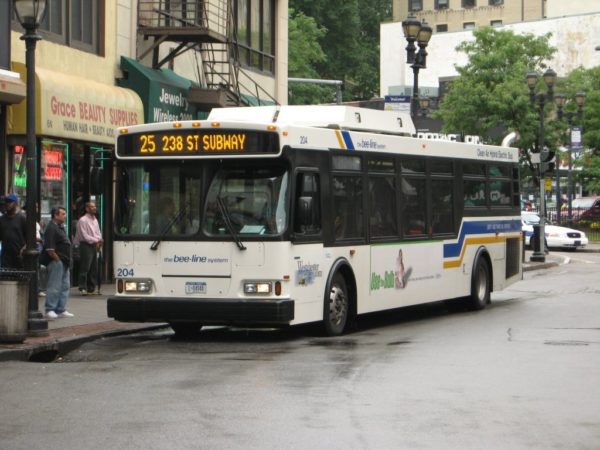Bee-Line transit system gets stung in new report highlighting need for reforms
The Tri-State Transportation Campaign (TSTC), a nonprofit policy and advocacy organization, published an analysis of Westchester County”™s Bee-Line transit system and found it lacking in many areas.
The Bee-Line is composed of 58 bus routes and services more than 27 million passengers a year. The system serves a county where 15% of households do not own car.
The TSTC report, “Bidding for a Better Bee-Line: Bringing Westchester”™s Bus System into the Future,” cited the county”™s preferential treatment of bus operator Liberty Lines, which it has contracted for more than 50 years. The result of this relationship, the report stated, was a noncompetitive environment in which the operator is enabled to deliver services inefficiently, unreliably and at a high cost.
“Westchester”™s contract and bidding process is abnormal, and the service is inefficient compared to other systems,” the report found.

Provisions in Liberty Lines”™ contract would force any potential bidder looking to take over operating duties from Liberty Lines to take on additional performance costs and be responsible for legal costs against Westchester County, in addition to a $20 million bond. These conditions ensure that Liberty Line has a monopoly on bus transportation in the county, which results in the inefficient system seen today.
According to TSTC, the county government is complicit in this inefficiency and monopoly by awarding Liberty Lines with contracts over the decades and never having open and competitive bidding process.
With Westchester County”™s current contract with Liberty Lines expiring in December 2023, TSTC suggested there is now an opportunity for a new bidding process to begin, starting with a Request for Information that would get a better understanding of potential operators”™ goals, plans for operations and associated price tags for services, resulting in a Request for Proposal for potential operators.
Should the county government form a new bus contract with an operator, TSTC next suggested the operator be held accountable for the quality of its services, defined by standards that measure the number of crashes and mechanical failures, timely performance, missed trips, cleanliness of busses and customer complaints.
“Bee-Line riders have been experiencing unreliable service for too long, so a system that encourages operators to produce great service is needed,” TSTC said in its report, adding that operators who fall short of these standards are to be penalized.
To ensure that a contract with reasonable key performance indicators is followed, the report said an oversight body composed of experts and auditors would need to exist to keep the operator in line of its contractual obligations. The Department of Public Works and Transportation in its current form is not up to the task, the report argued, lacking sufficient staff and meeting with Liberty Lines on an infrequent basis.
TSTC highlighted the inefficiencies of Liberty Lines and the consequences for the taxpayers and residenst of Westchester County by comparing it to other transit systems. The comparison found Bee-Line”™s buses were mostly older than the vehicles used in other systems and carried higher operating costs. For example, Bee-Line”™s operating expenses per vehicle revenue mile and per vehicle revenue hour was $18.67 and $201.31, respectively, whereas the Nassau Inter-County Express on Long Island came in at $14.04 and $160.86.
“Westchester County is putting more tax money and fare payments into the Bee-Line and getting relatively fewer service hours out than peer agencies do,” the report stated. “Simply put, riders and taxpayers in other regions are getting more for their money than Westchester taxpayers and riders are getting from Liberty Lines.”
Furthermore, the report found that Bee-Line buses are not in service for 24% of total miles and 15% of total hours, while average wait times between buses are at 21 minutes ”” with some passengers complaining about having to wait between 30 to 60 minutes to get on a bus.
“Adding frequency for buses, along with priority bus lanes, improves convenience, reliability and on-time performance for Westchester buses,” TSTC recommended, adding that such conditions are “essential for attracting and retaining riders on a transit system.”